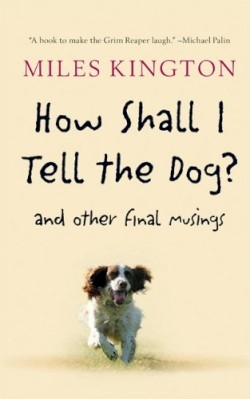How Shall I Tell the Dog?
And Other Final Musings
There seems to be a general assumption that if someone finds out they only have a short time left to live, they will become filled with “big thoughts” and a desire to make their last days meaningful—hence the proliferation of the so-called “bucket list” articles and books, aimed at guiding people to the places they should see or things they should do before they die. There is also an assumption, a somewhat American view, that it’s not polite to talk about someone’s impending death, or if it’s to be talked about, it should only be with sympathy and no deep discussion whatsoever.
Miles Kington died in January 2008 from cancer. A longtime British writer and editor (he worked for Punch, the London Times, and the Independent), he decided to face his approaching death with a different point of view: humor and realism. Taking the form of letters to his agent, Kington’s book is part view of dealing with terminal cancer, part working through the world of writing and publishing, and part seeing the world around him as it is, in all its smallness and inanity.
Through his letters, Kington explored a number of topics: why books like 1,000 Places to See Before You Die* are not only not helpful when one is actually dying, but they are “Threatening. Humourless. Grimly prescient … Nasty. Fun-free. Evil.” He contemplated writing his own book (A Hundred Things to Do Before I Die), or creating a list of IFAQs (the infrequently asked questions) about cancer, before realizing the true irony of his now-shortened life: that his dog and cat would most likely outlive him.
Along the way, Kington contemplated things like weight loss, shoe cobblers, the positive power of self-pity, planning one’s last words, funeral rites, and whether or not there’s a patron saint of cancer. The reader is brought along on this wry, sometimes uncomfortable, but always forthright and honest journey. Unlike books like The Last Lecture, where the dying person exhorts the healthy to go out and live their dreams, Kington focused on the little things in life and why they mattered even more once he knew his condition. Readers looking for an elegiac, somber tone will be disappointed in this book—but readers who appreciate a more honest, open approach, combined with humor that occasionally turns dark, will read this book in one sitting.
Reviewed by
Amy Rea
Disclosure: This article is not an endorsement, but a review. The publisher of this book provided free copies of the book to have their book reviewed by a professional reviewer. No fee was paid by the publisher for this review. Foreword Reviews only recommends books that we love. Foreword Magazine, Inc. is disclosing this in accordance with the Federal Trade Commission’s 16 CFR, Part 255.

